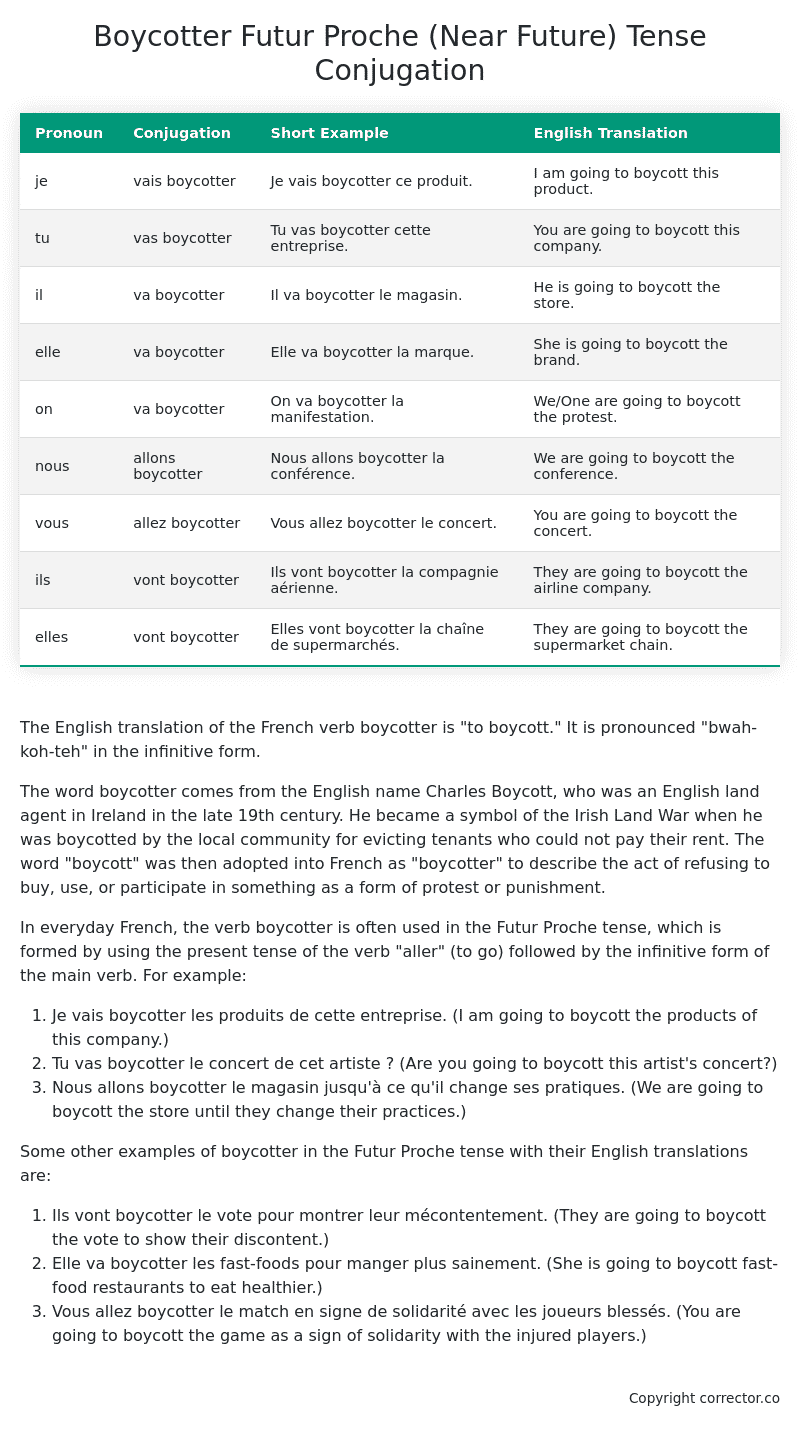Futur Proche (Near Future) Tense Conjugation of the French Verb boycotter
Introduction to the verb boycotter
The English translation of the French verb boycotter is “to boycott.” It is pronounced “bwah-koh-teh” in the infinitive form.
The word boycotter comes from the English name Charles Boycott, who was an English land agent in Ireland in the late 19th century. He became a symbol of the Irish Land War when he was boycotted by the local community for evicting tenants who could not pay their rent. The word “boycott” was then adopted into French as “boycotter” to describe the act of refusing to buy, use, or participate in something as a form of protest or punishment.
In everyday French, the verb boycotter is often used in the Futur Proche tense, which is formed by using the present tense of the verb “aller” (to go) followed by the infinitive form of the main verb. For example:
- Je vais boycotter les produits de cette entreprise. (I am going to boycott the products of this company.)
- Tu vas boycotter le concert de cet artiste ? (Are you going to boycott this artist’s concert?)
- Nous allons boycotter le magasin jusqu’à ce qu’il change ses pratiques. (We are going to boycott the store until they change their practices.)
Some other examples of boycotter in the Futur Proche tense with their English translations are:
- Ils vont boycotter le vote pour montrer leur mécontentement. (They are going to boycott the vote to show their discontent.)
- Elle va boycotter les fast-foods pour manger plus sainement. (She is going to boycott fast-food restaurants to eat healthier.)
- Vous allez boycotter le match en signe de solidarité avec les joueurs blessés. (You are going to boycott the game as a sign of solidarity with the injured players.)
Table of the Futur Proche (Near Future) Tense Conjugation of boycotter
| Pronoun | Conjugation | Short Example | English Translation |
|---|---|---|---|
| je | vais boycotter | Je vais boycotter ce produit. | I am going to boycott this product. |
| tu | vas boycotter | Tu vas boycotter cette entreprise. | You are going to boycott this company. |
| il | va boycotter | Il va boycotter le magasin. | He is going to boycott the store. |
| elle | va boycotter | Elle va boycotter la marque. | She is going to boycott the brand. |
| on | va boycotter | On va boycotter la manifestation. | We/One are going to boycott the protest. |
| nous | allons boycotter | Nous allons boycotter la conférence. | We are going to boycott the conference. |
| vous | allez boycotter | Vous allez boycotter le concert. | You are going to boycott the concert. |
| ils | vont boycotter | Ils vont boycotter la compagnie aérienne. | They are going to boycott the airline company. |
| elles | vont boycotter | Elles vont boycotter la chaîne de supermarchés. | They are going to boycott the supermarket chain. |
Other Conjugations for Boycotter.
Le Present (Present Tense) Conjugation of the French Verb boycotter
Imparfait (Imperfect) Tense Conjugation of the French Verb boycotter
Passé Simple (Simple Past) Tense Conjugation of the French Verb boycotter
Passé Composé (Present Perfect) Tense Conjugation of the French Verb boycotter
Futur Simple (Simple Future) Tense Conjugation of the French Verb boycotter
Futur Proche (Near Future) Tense Conjugation of the French Verb boycotter (this article)
Plus-que-parfait (Pluperfect) Tense Conjugation of the French Verb boycotter
Passé Antérieur (Past Anterior) Tense Conjugation of the French Verb boycotter
Futur Antérieur (Future Anterior) Tense Conjugation of the French Verb boycotter
Subjonctif Présent (Subjunctive Present) Tense Conjugation of the French Verb boycotter
Subjonctif Passé (Subjunctive Past) Tense Conjugation of the French Verb boycotter
Subjonctif Imparfait (Subjunctive Imperfect) Tense Conjugation of the French Verb boycotter
Subjonctif Plus-que-parfait (Subjunctive Pluperfect) Tense Conjugation of the French Verb boycotter
Conditionnel Présent (Conditional Present) Tense Conjugation of the French Verb boycotter
Conditionnel Passé (Conditional Past) Tense Conjugation of the French Verb boycotter
L’impératif Présent (Imperative Present) Tense Conjugation of the French Verb boycotter
L’infinitif Présent (Infinitive Present) Tense Conjugation of the French Verb boycotter
Struggling with French verbs or the language in general? Why not use our free French Grammar Checker – no registration required!
Get a FREE Download Study Sheet of this Conjugation 🔥
Simply right click the image below, click “save image” and get your free reference for the boycotter Futur Proche tense conjugation!

Boycotter – About the French Futur Proche (Near Future) Tense
Formation
1. Conjugate “aller” in the present tense according to the subject pronoun:
2. Add the infinitive of the main verb immediately after “aller.” For example:
Common Everyday Usage
Interactions with Other Tenses
Present Tense
Past Tense
Conditional Tense
Summary
I hope you enjoyed this article on the verb boycotter. Still in a learning mood? Check out another TOTALLY random French verb conjugation!


